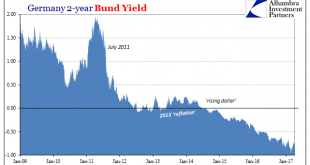In: Thomas Moser, Carlos Lenz, Marcel Savioz and Dirk Niepelt, editorial committee, Monetary Economic Issues Today, Festschrift in Honour of Ernst Baltensperger, Swiss National Bank/Orell Füssli, Zürich, June 2017. PDF of draft. The sovereign money initiative (Vollgeldinitiative) seeks to gain greater control over the money and credit supply, to increase financial stability and to achieve a fairer distribution of seigniorage income. The initiative’s suggested approach – a ban on active...
Read More »“It’s A Perfect Storm Of Negativity” – Veteran Trader Rejoins The Dark Side
Authored by Kevin Muir via The Macro Tourist blog, After many months of fighting all the naysayers predicting the next big stock market crash, I am finally succumbing to the seductive story of the dark side, and getting negative on equities. I am often early, so maybe this means the rally is about to accelerate to the upside. I am willing to take that chance. It would be just like me to pound the table on the long side,...
Read More »ECB Collateral Framework
In an ECB occasional paper, Ulrich Bindseil, Marco Corsi, Benjamin Sahel, and Ad Visser review the European Central Banks’s collateral framework. From the executive summary, on misconceptions: … differences e.g. with interbank repo markets: first, central banks are not subject to liquidity risk in the way “normal” market participants are, and can therefore accept less liquid collateral. Second, as the central bank has a zero default probability in its domestic market operations,...
Read More »Negative Rates: The New Gold Rush… For Gold Vaults
Negative interest rates and the populist uprising that spurred the UK to vote for Brexit and Americans to elect Trump has helped reignite a rush into physical safe haven assets like gold and silver, which however has led to a shortage of safe venues where to store the precious metals (unlike bitcoin, gold actually has a physical dimension). And now companies that operate storage facilities for precious metals and other...
Read More »The New Gold Rush… For Gold Vaults
Negative interest rates and the populist uprising that spurred the UK to vote for Brexit and Americans to elect Trump has helped reignite a rush into physical safe haven assets like gold and silver, which however has led to a shortage of safe venues where to store the precious metals (unlike bitcoin, gold actually has a physical dimension). And now companies that operate storage facilities for precious metals and other valuables are ramping up their capacity to help cash in on the soaring...
Read More »How to Undermine Central Bank Independence
The Economist reported about the history of central banks and their independence. One snippet: Typically, Richard Nixon took the bullying furthest, leaking a false story that Arthur Burns, Martin’s successor, was demanding a 50% pay rise. Attacked by the press, Burns retreated from his desire to raise interest rates.
Read More »DSGE Models for Monetary Policy Analysis
In a VoxEU eBook, Refet Gürkaynak and Cédric Tille collect the views of central bank and academic economists on DSGE models. In the introduction to the eBook, Gürkaynak and Tille summarize these views as follows: … there is agreement on the place of DSGE models in policy analysis. All see these models as part of the policymaker tool kit, while understanding their limitations and perceiving a similar road ahead.
Read More »Sweden’s Gold Reserves: 10,000 gold bars (pet rocks) shrouded in Official Secrecy
In February 2017 while preparing for a presentation in Gothenburg about central bank gold, I emailed Sweden’s central bank, the Riksbank, enquiring whether the Riksbank physically audits Sweden’s gold and whether it would provide me with a gold bar weight list of Sweden’s gold reserves (gold bar holdings). The Swedish official gold reserves are significant and amount to 125.7 tonnes, making the Swedish nation the...
Read More »The Global Burden
Bundesrepublik Deutscheland Finanzagentur GmbH (German Finance Agency) was created on September 19, 2000, in order to manage the German government’s short run liquidity needs. GFA took over the task after three separate agencies (Federal Ministry of Finance, Federal Securities Administration, and Deutsche Bundesbank) had previously shared responsibility for it. On September 17, 2014, almost exactly fourteen years...
Read More »“Should Central Banks Fear the Blockchain?,” European Financial Review, 2017
The European Financial Review, February-March 2017. HTML, PDF. See the VoxEU article.
Read More » Swiss Economicblogs.org
Swiss Economicblogs.org




